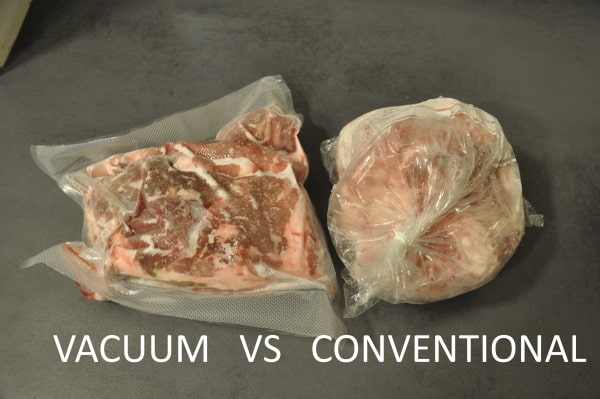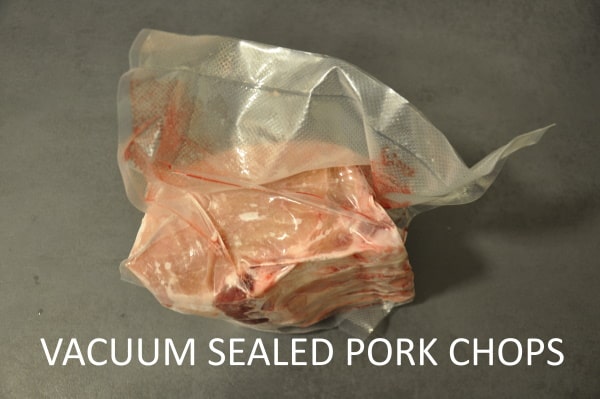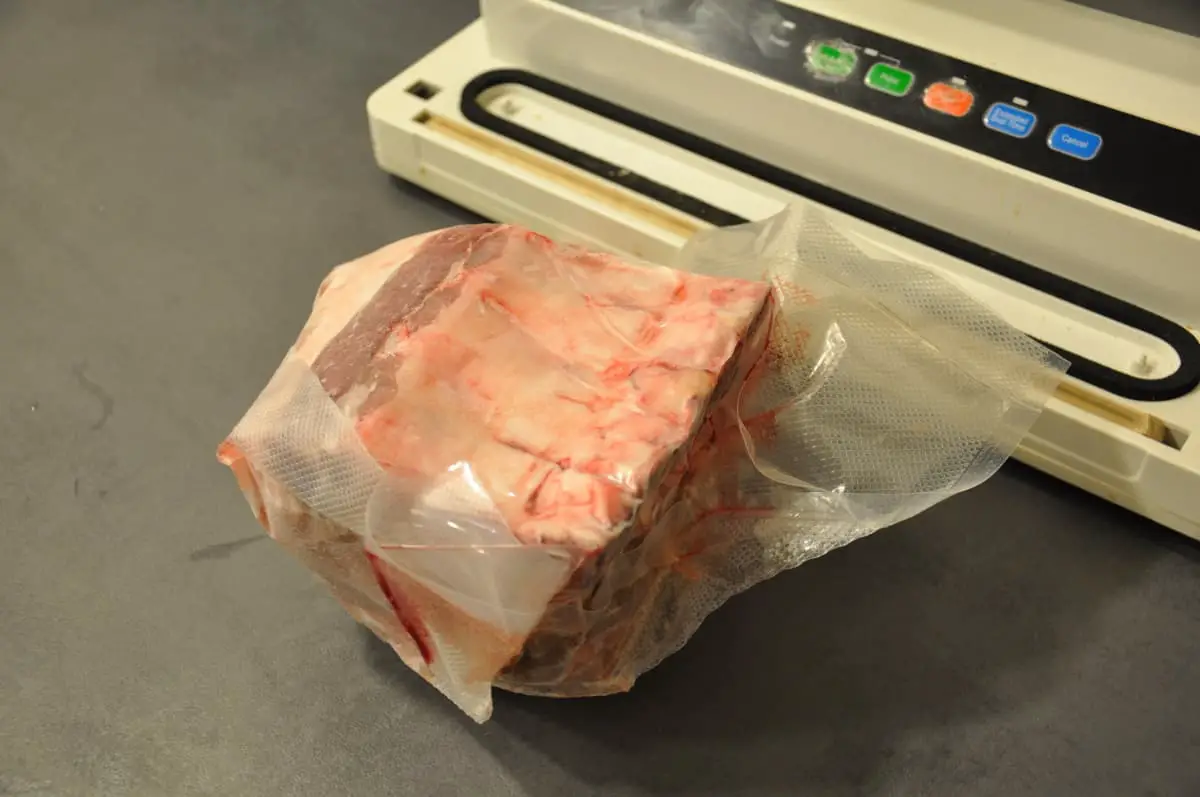Vacuum sealing is a method of food packaging. It is the process in which a vacuum sealer is used to remove excess air and moisture from the containers that hold shop-bought meat.
This process ensures that the meat stays fresh for longer as the decaying process is slowed down considerably.
The taste of the meat will be preserved for longer. In addition, vacuum sealed meat has a great shelf life, meaning that meat can be purchased in bulk.
According to vacuum packaging companies and the guidelines from USDA and FDA, it is clear that vacuum sealing food can significantly extend the shelf life of your meat. Vacuum sealing food can extend shelf life even two to three times.
| Meat | conventional stored meat - lasts in the freezer | vacuum sealed meat - lasts in freezer |
|---|---|---|
| Beef | 12 months | 2 years |
| Ground beef | 4 months | 1 year |
| Beef hamburger | 4 months | 1 year |
| Beef steak | 12 months | 2 years |
| Pork | 12 months | 2 years |
| Pork tenderloin | 12 months | 2 years |
| Pork chops | 12 months | 2 years |
| Pork loin | 12 months | 2 years |
| Ground pork | 4 months | 1 year |
| Ham | 1 month | 1-2 months |
| Bacon | 1 month | 2-3 months |
| Lamb | 12 months | 2 years |
| Lamb ground | 4 months | 1 year |
| Sausages | 1-2 months | 3-4 months |
| Fatty fish (Salmon, tuna...) | 3 months | 6-9 months |
| Lean fish (Cod, tilapia...) | 8 months | 1,5-2 years |
| Shrimp | 6-18 months | 2 years |
| Venison | 6 months | 2 years |
| Chicken parts | 9 months | 1,5 years |
| Chicken whole | 12 months | 2 years |
| Turkey | 12 months | 1,5 years |
| Butter | 6-12 months | 2-3 years |
| Soft cheese | 2 months | 6 months |
| Hard cheese | 4-6 months | 4-8 months |
Here are three of the best vacuum sealers based on reviews on Amazon to use when you go about freezing your meat:
Last update on 2024-06-28 / Affiliate links / Images from Amazon Product Advertising API
How long does vacuum sealed beef last in the freezer
Storing vacuum-sealed beef in the freezer will keep for between two and three years. That’s also a significant difference from conventional freezer storage.
Storing beef using the vacuum seal technique means that excess moisture is removed while the moisture in the beef is retained, ensuring a soft juicy steak after cooking.
There is a difference between storing beef in the freezer and storing vacuum sealed beef in the freezer. The process of vacuum sealing greatly extends the shelf life of beef.
If you store beef the traditional way in the refrigerator, it will only keep for one to two days at most. If you freeze the beef using the same method, it will keep in the freezer for six to 12 months.
On the other hand, if you vacuum seal the beef and store it in the refrigerator, it will keep for up to two weeks. That’s quite a difference from one to two days with traditional storage.

Factors that influence the shelf life of meat
There are several factors that will determine how long meat will stay fresh, even when vacuum sealed:
- Marinade ingredients
- Fridge temperature
- Acidity level or PH level
- The freshness of the meat
- The lamination used in the sealing process
- Sanitation levels and cleanliness of the meat
Vacuum sealed meat will more or less last for the same duration of time in the refrigerator and freezer. These include steaks, hamburgers, as well as ground beef.
How long does vacuum sealed pork last in the freezer
The ideal and optimal temperature to store vacuum sealed pork is at 40°F (4,4°C) or below. This is because bacteria will start to form from 40°F (4,4°C) to 140°F (60°C).
Similarly to beef, vacuum sealed pork will last for two to three years if stored at the right temperature in the freezer. This is regardless of the cut of meat and includes cuts like pork tenderloin, pork chops, and pork loin.
Vacuum sealed pork, stored at 40°F (4,4°C) or below in the refrigerator, can last for up to two weeks. But, with traditional storage methods, the pork will only last between four and seven days in the fridge.
However, if traditional storage methods are used, then roasts will last for four to 12 months in the freezer, while cooked cuts of pork stored using traditional methods may only last for two to three months.

How long does vacuum sealed ham and cured ham last in the freezer
The FDA recommends storing hams, cured hams, and other smoked and processed pork in the freezer for a total of one to two months. This applies if the ham has been fully cooked and vacuum sealed by the company.
Vacuum-sealed ham or cured ham from the same establishment may be stored in the refrigerator for up to two weeks or until the expiry date indicated on the packaging.
How long does vacuum sealed bacon last in the freezer
The FDA recommends storing bacon in the freezer for a total of one month. On the other hand, Vacuum sealed can last for up to 2-3 months.
Bacon can be stored in the refrigerator for up to one week after the expiration date. After this period, it is best to throw the bacon away.
If you shop bacon in the freezer in the traditional way, it can keep for up to a month. After this period, the fat begins to turn rancid.
How long does vacuum sealed sausage last in the freezer
The life expectancy of raw sausage depends on the type of sausage and the method of storage. Traditional storage methods state that raw sausage that has been frozen should have a shelf life of one to two months.
It should still be good after this date, but this is the maximum FDA requirement for consumption.
On the other hand, if it is vacuum sealed, most types of sausage can be stored in the freezer for two to three months.
How long does vacuum sealed smoked meat last in the freezer
Different types of smoked meat will have different lengths of shelf life. Vacuum sealed smoked meat (beef) should last for up to six months in the freezer and up to five days in the refrigerator.
The idea is to prepare the meat for storage as soon as possible. If left out for more than two hours, it is best to discard the meat.
How long does vacuum sealed fish last in the freezer
Whether you are storing salmon, tilapia, tuna, halibut, or any other raw fish, the procedure for storage remains the same.
When storing fatty fish such as (bluefish, catfish, mackerel, mullet, salmon, tuna, etc.) in the freezer using traditional methods, the fish may last up to three months.
Leaner fish that contain less fat, such as (tilapia, cod, flounder, haddock, halibut, sole etc.) may last up to six months in the freezer when using traditional storage methods.
However, vacuum sealing raw fish before storage in the freezer may last up to 6-9 months for fatty fish and 1,5-2 years for lean fish.
If properly thawed, there may be little difference in taste and texture between frozen and fresh fish.
How long does vacuum sealed shrimp last in the freezer
Precooked shrimp and raw shrimp may be stored in the freezer, using traditional methods, for anywhere between six and eighteen months in the freezer.
When shrimp is vacuum sealed and stored at the correct temperature in the freezer, the shrimp may last up to two years.
How long does vacuum sealed venison last in the freezer
The same rules apply to vacuum sealing and storing venison as to beef. Using conventional freezing methods, game meat like deer and other game meat can be stored in the freezer for up to six months.
However, if the venison has been vacuum sealed, the shelf life of the meat can be extended by up to two years. For best quality, game meat should be stored at 0°F or colder for 3 months using conventional storage methods and up to two years after vacuum sealing.
How long does vacuum sealed chicken last in the freezer
Chicken meat that has been vacuum sealed and packaged will keep in the freezer for up to nine months. Chicken parts that have been vacuum sealed will stay fresh for nine months, while whole chicken will stay fresh for up to 12 months.
The duration for raw chicken, cooked chicken as well as chicken pieces are all similar. All chicken, whether frozen or cooked that has been vacuum sealed will last anywhere from 12 months up to two years in the freezer.
How long does vacuum sealed turkey last in the freezer
A frozen turkey can keep in your freezer for up to a year. This time period is slightly extended if the turkey has been vacuum sealed. The FDA states that the turkey should have an indefinite shelf life if it has been frozen uniformly at 0° F.
With conventional storage, raw turkey can be kept in the freezer for up to twelve months, while oiled turkey can be kept in the freezer for up to four months.
How long does vacuum sealed butter last in the freezer
Most people may wonder if you are able to vacuum seal butter. The answer is yes, and it will help preserve the butter for a longer time.
Traditional storage methods will save butter for six to twelve months. However, vacuum sealed butter will last anywhere from two to three years in the freezer.
How long will vacuum sealed cheese last in the freezer
Vacuum sealing cheese will extend the life of the cheese by several months. Generally, cream cheese and soft cheese may be vacuum sealed and stored in the freezer for up to six months.
Hard cheese may be vacuum sealed and stored in the freezer for anywhere from four to eight months.
Conclusion
Vacuum packing meat or cheese is a great way to extend the shelf life of the food item. Of course, the food must be stored at the proper temperature for this technique to be effective.
Furthermore, if you use the right methods to store these foods, you can enjoy a longer shelf life and have more peace of mind that food will not spoil before you have a chance to eat it.




